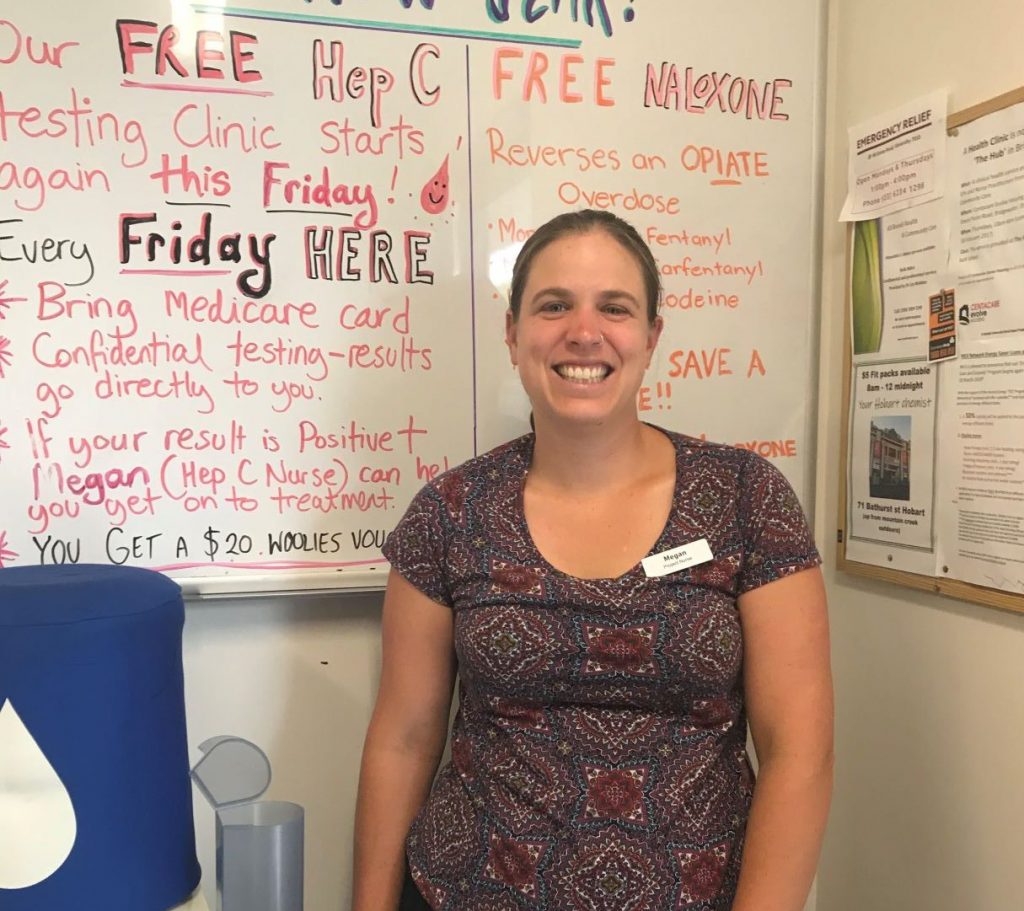Hep C testing clinics: what can you expect?
March 5, 2021

A free and confidential testing clinic for people at risk of carrying or developing Hepatitis C will be extended throughout March in Glenorchy. A second clinic is also underway in Launceston, and it will be Burnie’s turn in April and May.
The clinics are being run as part of the Tasmanian Government’s Eliminate Hep C program. Around 70 people have attended clinics hosted by Anglicare Tasmania at its Needle and Syringe Program (NSP) facilities to date.
We asked Megan Hughes, a registered nurse from Sexual Health Tasmania, to tell us more about Hepatitis C, how it can be treated and what people can expect from the clinic.
What is Hepatitis C, and who is at risk?
‘Hep C’ is a blood-borne virus that damages a person’s liver. The virus can be transmitted through the sharing of injecting equipment or if you get a tattoo done with equipment that hasn’t been sterilised, but it’s important to understand that any blood-to-blood contact carries this risk.
Many people don’t know they are carrying the virus, or that there are excellent treatments available. Unfortunately, there is still considerable stigma attached to the condition.
What symptoms should people look out for?
Everyone experiences Hep C differently, but symptoms can include tiredness, trouble sleeping, mood swings, anxiety and depression, nausea and poor appetite. But it’s important to remember that people don’t show any symptoms at all. The earlier you seek treatment the better – and a test is the only way you can find out if you have Hep C.
How do people access the clinic?
If you live in the south, simply drop into Anglicare’s office at 436 Main Road, Glenorchy on any Friday in March between 10.00 a.m. and 4.00 p.m. (the clinic is closed between 12 noon and 12.30 p.m.)
A clinic is also currently open in Launceston at the Salvation Army offices at 111 Elizabeth Street. It operates between 9.30 a.m. and 2.30 p.m. every Tuesday.
What do they need to bring?
Just a Medicare card and a phone number we can contact you on.
Why are the clinics being held at Anglicare?
The Eliminate Hep C program wanted a welcoming, non-judgmental environment, a special space, somewhere that might already be familiar to some people who already access Anglicare’s Needle and Syringe Program, or NSP.
Our aim is to make it as easy as possible for people who think they may be at risk to access potentially life-changing treatment.
It’s really handy because the NSP staff are close by if you would like to talk to someone about your drug use, and they can also refer you on to other services that you may require. This is optional; it’s totally up to you.
What does the test involve?
A quick and simple blood sample, taken in a private room.
What happens next?
We will contact you, in full confidence. If your test comes back positive, we will support you. We find out more about your liver health and provide you with a prescription that you take straight to a pharmacy. You don’t need to involve any other medical practitioners unless you want to.
What is the treatment, and how effective is it?
The latest treatment has a 95-97 per cent success rate, and minimal side effects. All you need to do is take one tablet a day for either eight or 12 weeks, depending on whether you may have other health issues. Then there’s a final blood test to confirm that the virus has been cleared from your body.
What difference does it make to a person’s everyday life?
Your quality of life will improve a lot. We want as many people as possible to know that they don’t need to ‘put up’ with this virus any more.
Can a person contract Hepatitis C again after treatment?
Yes, they can. That’s why we encourage people to talk with us about how they can keep themselves virus-free.
David’s experience
Anglicare client David (not his real name) thought his fatigue, joint pain, poor appetite and depression was simply a part of getting older. When it was suggested that he might have Hepatitis C, he became very anxious about his health and what people would think.
“Getting tested and then accessing treatment when my test came back positive was so quick and easy,” he says.
Because the whole process was confidential and professional, I didn’t feel judged. Now I feel much better in myself and I don’t have to worry about long-term damage to my liver any more. It’s also good to know that I can’t pass the virus on to someone else.
Advance details: Burnie clinic
Anglicare’s Burnie office in Wilmot Street will host a clinic in April and May.
April 21: 1.00 p.m. – 2.30 p.m.
April 22: 10.00 a.m. – 2.30 p.m.
April 23: 10.00 a.m. – 12.30 p.m.
May 5: 1.00 p.m. – 2.30 p.m.
May 6: 10:00 a.m. – 2.30 p.m.
May 7: 10.00 a.m. – 12.30 p.m.
Community education sessions
Anglicare’s Hepatitis Prevention Program provides one hour community education sessions that focus on the following topics:
- What is hepatitis? the basics
- Hepatitis risks and health issues
- Processes and treatments
- Stigma and discrimination
- Prevention and harm minimisation.
Enquire about a session near you here.
Further information?
Anglicare – if you live in the South or North West: 1800 243 242
Salvation Army – if you live in the North: 13 72 58
Hepatitis Australia – including information in languages other than English.
PHOTO: Nurse Megan Hughes, pictured at Anglicare’s NSP facility in Glenorchy.

